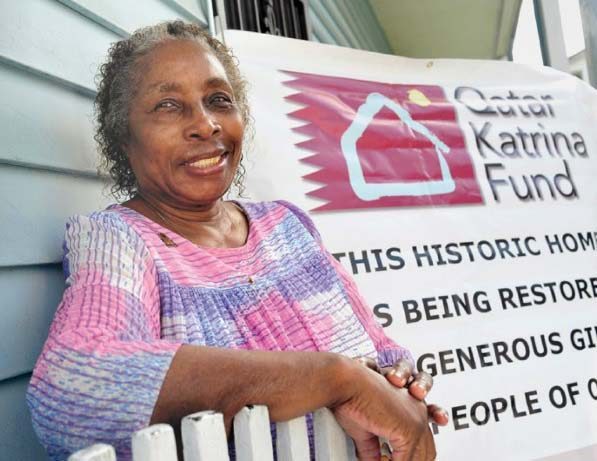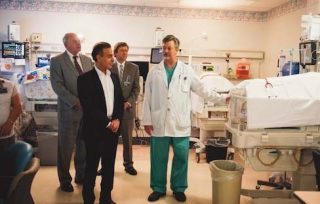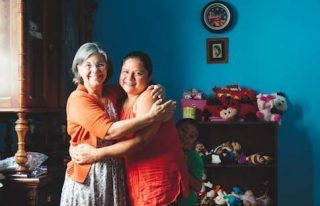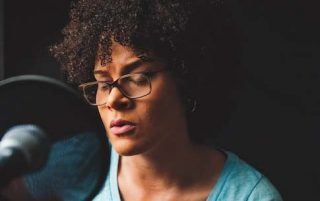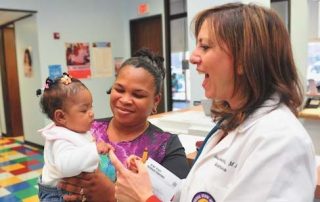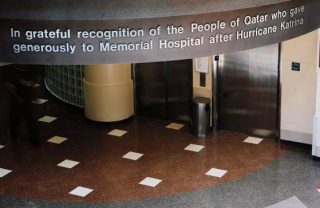All photos courtesy of Qatar Katrina Fund
Marking the 10th anniversary of the devastating Hurricane Katrina in the US, singer Marlon Jackson, civil rights activist Rev. Jesse Jackson and the mayor of New Orleans will take part in commemorations organized by Qatar this week.
On Aug. 29, 2005 the Gulf coast of the US was destroyed by Katrina, in what became the most costly natural disaster in the country’s history, killing at least 1,800 people and destroying half-a-million homes.
Within two weeks of the force five storm, Qatar pledged to donate $100 million to help with the massive recovery effort in the affected areas.

Some 18 projects related to rebuilding housing, providing much-needed health care and support with education in Mississippi, Louisiana and Alabama were given grants, scholarships and resources through the Qatar Katrina Fund.
The Gulf country’s then-Emir Sheikh Hamad bin Khalifa Al Thani visited New Orleans in spring 2008 to see how the city and surrounding districts were being rebuilt, The New York Times reported at the time.
Now, to mark the 10th anniversary of the disaster, Qatar’s ambassador in Washington DC, Mohammed Al Kuwari, will meet some of those who benefited from the funding during a four-day visit to New Orleans, starting today (Wednesday).
Marlon Jackson of the Jackson 5 will be among the famous names due to attend a lunch hosted by the ambassador and organized with charity Habitat for Humanity tomorrow (Aug. 27) to “pay homage” to those involved in rebuilding the region, Al Kuwari said on Twitter.
Excited to announce Marlon Jackson- star of my fav song #WeAreTheWorld will join Qatar Katrina lunch in #NewOrleans pic.twitter.com/5XR408RMig
— Mohamed Jaham (@Amb_AlKuwari) August 22, 2015
During the visit, Al Kuwari is also expected to meet with civil rights activist Rev. Jesse Jackson and Mayor of New Orleans Mitch Landrieu, as well as seeing how the neighborhoods which were destroyed by Katrina have been rebuilt.
Building houses
Of the $100 million fund, $38.4 million was given to education, $34.1 million to housing and $27.5 million dedicated to healthcare.
Here’s a breakdown of the largest recipients of the donations:

Non-profit organization Habitat for Humanity, which was heavily involved in helping repair and build from scratch thousands of houses in the region, received $22 million from the Qatar Katrina Fund – the largest single grant given through the fund.
The donation paid for a third of the charity’s total costs in the area and built 338 new homes for families misplaced by the disaster in Louisiana, Mississippi and Alabama.
After her own New Orleans house was destroyed by Hurricane Katrina, Pat Hebard worked with Habitat volunteers to help build her new home in Lafayette Parish.
“It feels wonderful to own a house, but it’s even more wonderful because I helped build the house. It’s a different kind of feeling,” she said.
The New Orleans district of Treme/Lafitte is the oldest African-American neighborhood in the US and more than half of its historic buildings were seriously damaged during the storm.

A $2.5 million grant from the QKF helped to renovate more than 100 buildings, enabling residents to return to their homes.
Stacy Horn Koch, organizer of the Tremé/Lafitte Renewal Project, said: “Hurricanes are equal opportunity destroyers, but it’s not equal when you have to rebuild. These (residents of the district) are people working for minimum wage, coming back to homes that are destroyed, they haven’t been paid for a month or more – how are they going to rebuild?
“I wish more people were like the Emir (of Qatar), in leadership, that there were more acts of goodness. Then maybe we wouldn’t have so much horrible stuff going on, less worry about what people believe and more emphasis on just being good.”
Scholarships
Damage from the hurricane forced many universities in the affected areas to temporarily close, and with many thousands of people out of work and homeless, students were faced with potentially dropping out of higher education.
The fund provided more than 2,000 student scholarships to those most in need at Tulane, Loyola, Xavier and Louisiana state universities.
The largest single employer in New Orleans, Tulane University received a $10 million grant to pay for the education of 180 students under the Qatar Tulane Scholars Fund.

For Chad Cramer, the scholarship paid for a five-year masters of architecture degree and has enabled him to now work as an urban designer for the City of New Orleans.
Xavier University in Louisiana was forced to close for the fall semester of 2005, however when it reopened many of its students were financially struggling.
It got a $5 million scholarship fund, which was distributed to 500 students, while a further donation of $12.5 million built a new pharmacy building, the Qatar Pharmacy Pavilion, to help address Louisiana’s shortage of trained doctors and pharmacists.
Healthcare
The Memorial Hospital in Gulfport, Mississippi was one of a number of health-related organizations in the region that was helped by the Qatar Fund.

In the aftermath of the hurricane, the number of uninsured patients needing medical treatment soared and the cost of caring for these patients was estimated at $28.8 million per year.
A $10.8 million donation established the Qatar Hope Fund at the hospital, which has helped provide medical care to thousands of low-income patients without insurance who would not otherwise have been able to afford treatment.
The hospital has been renovated since Katrina and has recently opened the first neonatal clinic in southern Mississippi.
Funding also enabled community and mobile health centers to be set up in areas with no local healthcare provision. A $3 million grant allowed March of Dimes to buy three new mum-and-baby mobile health units, which provide prenatal and early pediatric care for mothers and babies affected by Katrina.
Book and film
This week also marks the official launch of the book, Qatar Katrina Fund: 10 years after the storm, and a short film Qatar Katrina Fund: After the storm, both of which feature short interviews heads of charities, hospitals, organizations and everyday people who were recipients of the funding.
The book and the film are both available on the fund’s website. A spokesperson for the Washington DC-based Qatari mission described the book as “a story of Qatar’s gift and its role in the renewal of a legendary American city and its surrounding community.”
Speaking on the film about the projects funded through Qatar’s donation, Al Kuwari said:
“We were happy to see afterwards that we brought joy and happiness to the people and at the same time, we have friends now in the US who are very close to us. We are proud to see our project as benefiting a lot of people.”
Thoughts?

